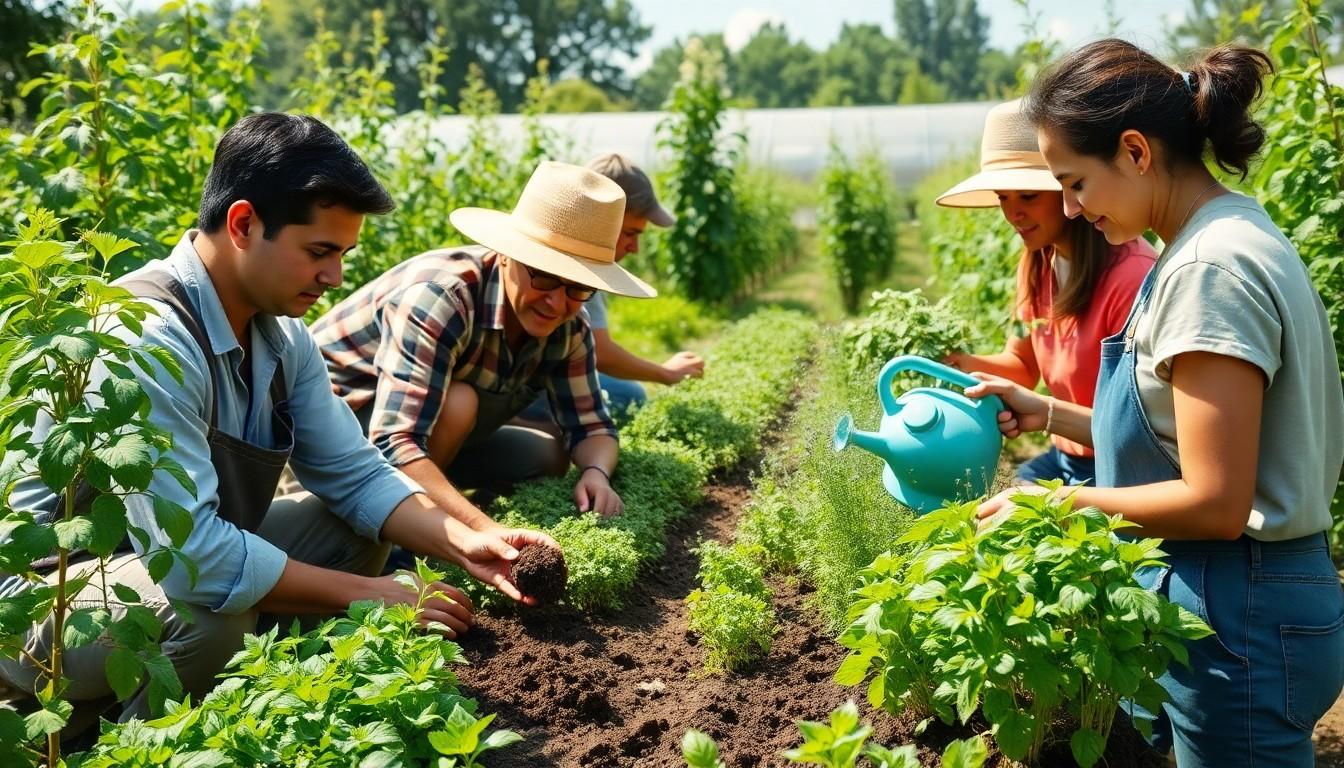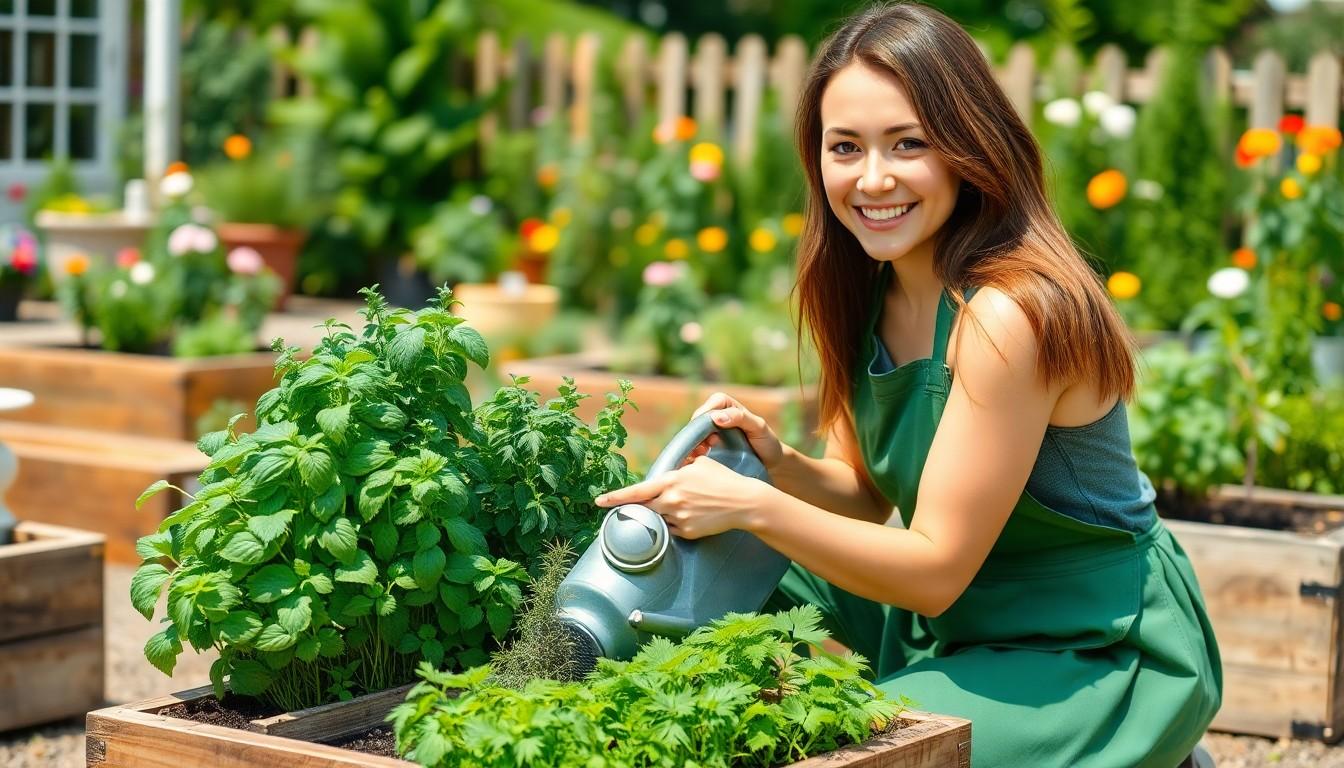Imagine stepping into a world where fresh basil, fragrant thyme, and zesty cilantro are just a snip away. Herb farming isn’t just for the green-thumbed elite; it’s for anyone who craves a touch of nature in their life. With the right knowledge and a sprinkle of enthusiasm, anyone can cultivate a thriving herb garden that’ll make even the most seasoned chefs drool.
In the realm of herb farming, the possibilities are endless. Whether you’re growing in a sunny backyard or a cozy windowsill, these little green wonders can transform meals and elevate your culinary game. So, grab your gardening gloves and get ready to dig into the delightful adventure of herb farming—where the only thing better than the aroma is the satisfaction of growing your own ingredients. Who knew that becoming a herb master could be this fun?
Herb Farming TWW
Herb farming offers a straightforward way to cultivate flavorful plants. Growing herbs provides both culinary benefits and personal satisfaction.
Benefits of Herb Farming
Herb farming promotes access to fresh and organic ingredients. Fresh basil enhances pasta dishes, while homegrown cilantro adds zest to salsas. Growing herbs also encourages healthier eating habits. Individuals often incorporate their home-harvested herbs into daily meals, reducing reliance on processed products. Cost savings accrue when families cultivate their spices, avoiding high store prices. Gardening serves as a stress-relief activity, allowing individuals to connect with nature. It’s rewarding to see the growth from seed to harvest, contributing to a sense of achievement.
Challenges in Herb Farming
Herb farming requires attention and knowledge of specific plant needs. Different herbs may demand varying sunlight hours and watering schedules. Pest infestations can threaten crop health, necessitating diligence. Gardeners must monitor for signs of disease or uninvited critters. Limited space, particularly for urban gardeners, often complicates herb cultivation, but vertical gardening techniques can address this constraint. Seasonal changes can impact herb growth, with some varieties thriving in warmer months and others in cooler climates. Overcoming these challenges enhances skills and appreciation for the farming process.
Techniques for Successful Herb Farming TWW

Successful herb farming involves several key techniques that enhance growth and yield.
Soil Preparation and Fertility
Soil health plays a crucial role in herb growth. Begin by selecting loamy soil with good drainage. Testing soil pH helps determine its acidity; most herbs thrive in a pH range of 6 to 7. Adding organic matter like compost enriches nutrients, promoting robust plant development. Rotating crops prevents nutrient depletion and reduces pest issues. Mulching around the base of plants retains moisture and maintains even soil temperature.
Watering and Irrigation Methods
Effective watering ensures herbs receive adequate moisture without waterlogging. Early morning is the best time for watering, allowing foliage to dry before evening, which prevents disease. Drip irrigation minimizes wastage and delivers water directly to the roots. Consider using self-watering containers to maintain consistent moisture levels, particularly for indoor herb gardens. Monitor moisture levels by checking the soil’s surface for dryness.
Pest Management Strategies
Implementing integrated pest management minimizes damaging insect populations. Regularly inspecting plants for pests, such as aphids and spider mites, leads to early intervention. Introducing beneficial insects, like ladybugs, naturally controls pest numbers. Neem oil and insecticidal soap serve as effective organic treatments when infestations arise. Maintaining cleanliness around the garden area further deters pests from establishing a presence.
Popular Herbs for Farming TWW
Herbs such as basil, thyme, and cilantro stand out for home farming due to their culinary and medicinal benefits. Understanding which herbs to grow enhances the overall gardening experience.
Culinary Herbs
Culinary herbs serve as essential ingredients in kitchens. Basil adds freshness to sauces and salads, while thyme lends depth to savory dishes. Cilantro provides zesty undertones in various cuisines, especially in Mexican and Asian recipes. Chives and parsley also offer distinct flavors, making them popular choices among home cooks. All these herbs thrive in well-drained soil with ample sunlight, contributing to flavor enhancements in meals.
Medicinal Herbs
Medicinal herbs provide health benefits beyond culinary uses. Peppermint aids digestion and promotes relaxation, while chamomile is known for its calming properties. Lavender offers stress relief and enhances sleep quality. Others, such as oregano, possess antimicrobial properties that support overall wellness. These herbs can thrive with proper care, including suitable sunlight and watering practices, reinforcing their versatility in gardens.
Economic Considerations in Herb Farming TWW
Herb farming presents a unique economic landscape, offering both costs and opportunities for gardeners.
Cost Analysis
Initial investment typically includes seeds, soil, containers, and tools. These costs range from $20 to $100, depending on the scale of the operation. Maintenance expenses may include fertilizers, pest control, and water, which fluctuate based on the gardening method. Urban farmers may spend less due to smaller spaces, while larger plots may incur higher costs. Calculating potential returns is vital. Fresh herbs sell at local markets for $2 to $5 per bunch, which can quickly offset initial investments.
Market Trends and Opportunities
Growing demand for fresh herbs has surged in recent years, driven by culinary enthusiasts and health-conscious consumers. Specialty markets and grocery stores increasingly prioritize organic and locally sourced products. The rise of online sales platforms offers additional avenues for profit, enabling farmers to reach broader audiences. Seasonal variations present a chance to capitalize on trends, with certain herbs fetching premium prices during holidays or local food festivals. Engaging in niche markets, such as gourmet restaurants or wellness shops, enhances opportunities for growth.
Fosters Personal Growth
Herb farming offers a fulfilling journey that combines the joy of gardening with the benefits of fresh ingredients. Whether it’s for culinary delights or medicinal purposes growing herbs can transform cooking and enhance well-being.
Embracing the challenges of herb cultivation fosters personal growth and a deeper connection to nature. With the right techniques and a bit of patience anyone can enjoy the fruits of their labor while reaping the rewards of homegrown herbs.
As interest in organic and locally sourced produce continues to rise herb farming stands out as a practical and rewarding venture. It’s an opportunity to explore creativity in the kitchen while contributing to a healthier lifestyle and potentially generating income.

